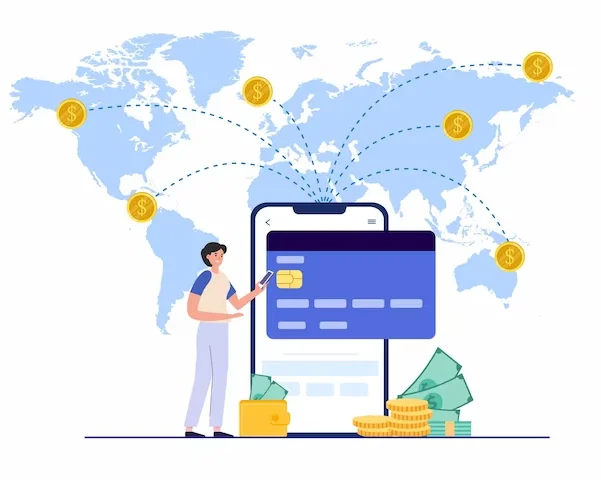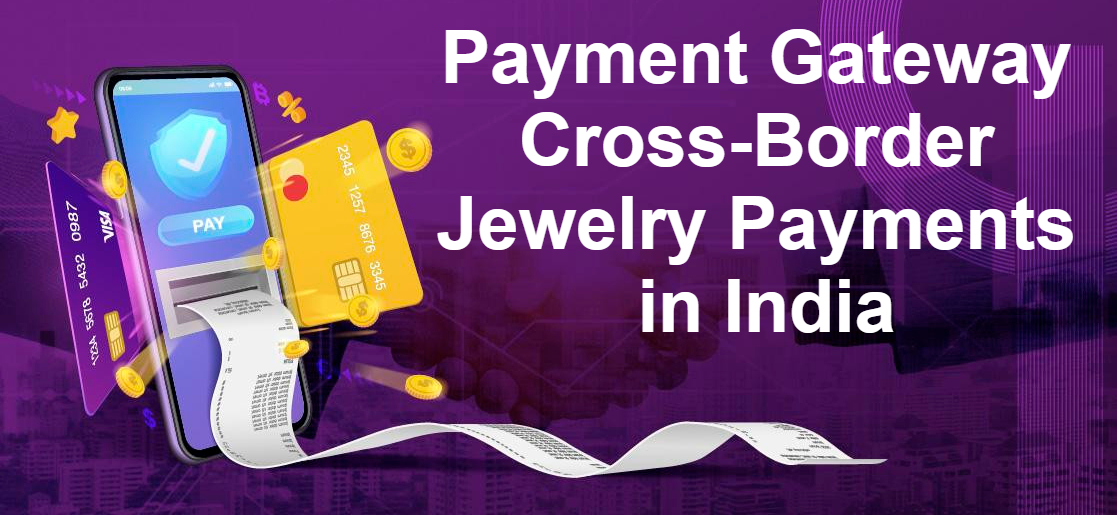Author : Winnie Rogers
Introduction

India has long been recognized as a global hub for jewelry manufacturing, trading, and retail. With an increasing number of jewelry businesses expanding internationally, the need for efficient payment[1] processing solutions has become paramount. Payment gateways for cross-border jewelry payments in India play a pivotal role in facilitating secure and seamless transactions for businesses and customers across borders. In this article, we will explore the importance of cross-border payment gateways, the challenges involved, and the benefits they offer to the jewelry[2] industry in India.
Introduction to Cross-Border Jewelry Payments in India
As the global demand for jewelry continues to rise, Indian jewelers are tapping into international markets to expand their reach. However, when conducting international transactions, several challenges arise, including currency conversion, international fraud risks[3], and varying financial regulations in different countries.
A payment gateway for cross-border jewelry payments in India addresses these challenges by offering a reliable, secure, and efficient way to process payments across different currencies. These solutions allow businesses to accept payments from customers around the world, enabling seamless transactions while mitigating potential risks associated with international payments.
Why Do Jewelers in India Need Cross-Border Payment Gateways?
The jewelry industry in India is not just a significant part of the economy but also an essential player in the global market. In fact, India is one of the largest exporters of gold jewelry, diamonds, and precious stones. As the industry grows, so does the need for an efficient and secure mechanism for processing payments from customers[4] worldwide.
Here are some key reasons why cross-border payment gateways are essential for Indian jewelers:
- Global Reach: The ability to accept payments from international customers opens up new opportunities for Indian jewelry businesses[5]. A payment gateway for cross-border jewelry payments in India ensures that jewelers can sell their products globally, without worrying about payment complexities.
- Currency Conversion: International transactions often involve currency conversion, and cross-border payment gateways handle these conversions seamlessly. This ensures that jewelers receive payments in their local currency, eliminating the need for manual conversions.
- Security: Payment security is a top concern when processing cross-border transactions. Fraudulent activities, chargebacks, and identity theft can be a risk when handling payments from different countries. A reputable cross-border payment gateway offers secure encryption and fraud protection to mitigate these risks.
- Speed: Traditional banking methods for international payments can be slow, involving lengthy processing times. Payment gateways streamline the process, allowing for near-instant payment processing, improving cash flow for jewelry businesses.
- Regulatory Compliance: Each country has its own regulations regarding cross-border transactions. A payment gateway for cross-border jewelry payments in India ensures that businesses remain compliant with local and international laws, minimizing legal risks.
How Does a Payment Gateway for Cross-Border Jewelry Payments Work?
A payment gateway acts as an intermediary between the customer and the business, facilitating the secure transfer of funds. Here’s a step-by-step explanation of how the process works:

- Customer Payment: The customer selects the jewelry item they wish to purchase and chooses their preferred payment method (credit card, debit card, or other online payment methods).
- Transaction Details: The payment gateway securely encrypts the transaction details, including the amount and payment information, and sends it to the bank for authorization.
- Authorization: The payment gateway communicates with the customer’s bank (issuer) to confirm that the funds are available and that the transaction is legitimate.
- Currency Conversion: If the payment is being made in a foreign currency, the payment gateway handles the currency conversion process, ensuring the correct amount is transferred to the jeweler’s account in Indian Rupees (INR).
- Payment Confirmation: Once the payment is authorized, the payment gateway sends a confirmation to both the customer and the jewelry business. The transaction is completed, and the goods are shipped.
- Settlement: The funds are transferred from the customer’s bank to the jeweler’s payment gateway account, from where they are deposited into the jeweler’s business account.
Benefits of Payment Gateways for Cross-Border Jewelry Payments
The integration of a payment gateway for cross-border jewelry payments in India offers numerous advantages for both businesses and customers. Let’s delve into some of the key benefits:
1. Increased International Sales
With the ability to accept payments from customers worldwide, Indian jewelers can tap into international markets with ease. A seamless payment process increases customer confidence and makes it easier for them to purchase jewelry without worrying about payment issues.
2. Reduced Risk of Fraud
Payment gateways utilize advanced encryption and fraud detection mechanisms to safeguard against fraudulent transactions. By offering secure transactions, jewelers can protect both their businesses and their customers.
3. Enhanced Customer Experience
Cross-border payment gateways provide customers with various payment options, including credit/debit cards, digital wallets, and bank transfers. This flexibility enhances the shopping experience and encourages customers to make purchases.
4. Faster Transactions
One of the most significant advantages of using payment gateways for cross-border jewelry payments in India is the speed of transactions. Traditional bank transfers can take several days, but with a payment gateway, funds are processed quickly, ensuring faster delivery and better cash flow management.
5. Lower Transaction Costs
International payments often involve high transaction fees, including hidden charges for currency conversion. Many cross-border payment gateways offer competitive exchange rates and lower fees, reducing the overall cost for businesses.
6. Compliance with Global Standards
A reliable payment gateway ensures that businesses comply with international financial regulations, such as anti-money laundering (AML) and Know Your Customer (KYC) requirements, thereby avoiding legal complications.
Popular Payment Gateways for Cross-Border Jewelry Payments in India
Several payment gateways cater specifically to businesses that engage in cross-border transactions. Some of the most popular platforms in India include:

- PayPal: One of the most widely recognized payment gateways globally, PayPal offers international payment solutions with robust fraud protection and multi-currency support.
- Razorpay: A popular payment gateway in India, Razorpay offers cross-border payment solutions with competitive exchange rates and the ability to accept payments from over 100 currencies.
- Instamojo: Instamojo enables Indian jewelers to accept international payments with ease, featuring a user-friendly interface and secure payment processing.
- PayU: PayU supports cross-border payments and is known for its global payment network, making it an excellent choice for businesses dealing with international customers.
Challenges of Cross-Border Jewelry Payments in India
Despite the many advantages, there are some challenges that businesses need to consider when using payment gateways for cross-border jewelry payments in India:
1. Currency Fluctuations
Currency exchange rates can fluctuate, affecting the final amount received by the jeweler. Businesses must carefully manage this risk when dealing with international transactions.
2. Cross-Border Fees
Some payment gateways charge higher fees for cross-border transactions, which can reduce the profit margins for jewelers. It is essential to choose a payment gateway that offers transparent fee structures.
3. Compliance with Local Laws
India has specific regulations for cross-border transactions, and businesses must ensure compliance with both Indian and international laws to avoid legal issues.
Conclusion
The rise of cross-border trade presents exciting opportunities for India’s jewelry industry. Payment gateway solutions for cross-border jewelry payments in India provide businesses with the tools they need to operate globally, expand their market reach, and enhance customer satisfaction. By selecting the right payment gateway, jewelers can overcome challenges related to international payments, reduce risks, and ensure that their businesses continue to thrive in a competitive global market.
FAQs
1. What is a cross-border payment gateway?
A cross-border payment gateway facilitates international transactions, enabling businesses to accept payments from customers in different countries and currencies.
2. Why is a payment gateway important for jewelry businesses in India?
It allows jewelry businesses to expand their customer base internationally, accept payments in different currencies, and ensure secure, fast, and reliable transactions.
3. How do cross-border payment gateways handle currency conversion?
Payment gateways automatically convert foreign currency into Indian Rupees (INR) at competitive exchange rates, saving businesses time and effort in manual currency conversion.
4. Are cross-border payment gateways secure?
Yes, reputable cross-border payment gateways use advanced encryption, fraud detection, and compliance with international security standards to ensure secure transactions.
5. What are the costs associated with using cross-border payment gateways?
The costs can vary depending on the gateway provider. Typically, fees include transaction fees, currency conversion charges, and cross-border transaction fees. Always compare providers to find the best deal.

